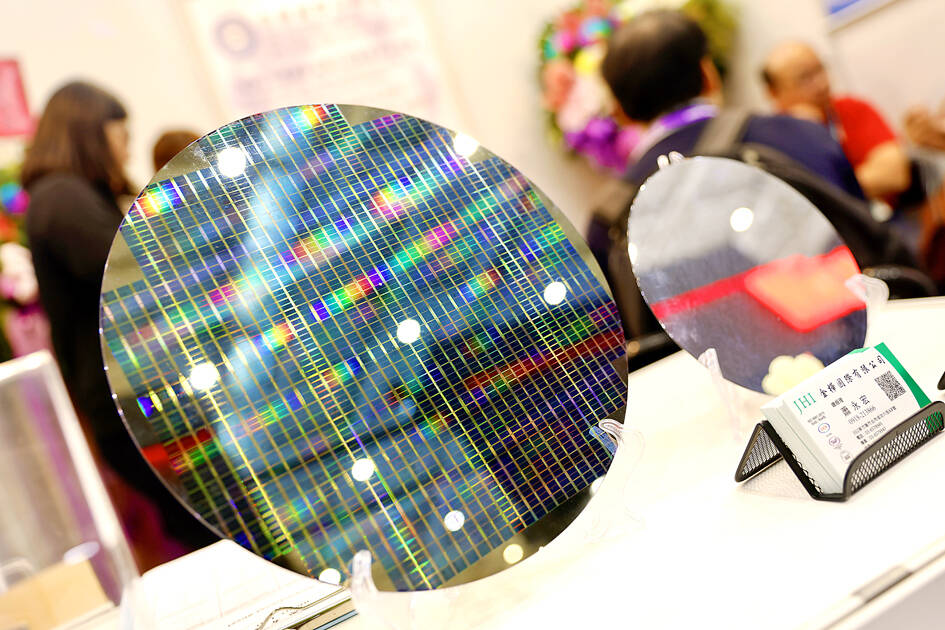Taiwan’s semiconductor industry is expected to see its production value grow by 16.5 percent next year to top NT$6.17 trillion (US$192.28 billion) for the first time, fueled by sustained demand for artificial intelligence (AI) and high-performance computing (HPC) devices such as servers and data centers, the Industrial Technology Research Institute (ITRI, 工研院) said yesterday.
That meant Taiwan would outpace the global semiconductor industry, which is expected to expand by 12.5 percent in production value to US$684 billion next year, according to the institute.
Taiwan’s foundry sector would be the biggest beneficiary of this AI boom, with an annual expansion of 20.1 percent in production value next year to NT$3.86 trillion, Terry Fan (范哲豪), a semiconductor analyst with ITRI’s Science and Technology International Strategy Center, said at an industry forum in Taipei.

Photo: RITCHIE B. TONGO, EPA-EFE
The foundry sector’s production value would reach NT$28.60 billion next year, thanks largely to robust demand for advanced technologies including 3-nanometer and 2-nanometer chips, Fan said.
“The rise of generative AI is stimulating demand for HPC devices that are powered by advanced chips,” Fan said. “That is reflected in the fact that more than half of Taiwan Semiconductor Manufacturing Co’s (TSMC, 台積電) wafer revenue came from HPC chips.”
TSMC is a major supplier of 3-nanometer technology in the industry and would be the world’s first to offer 2-nanometer technology next year, the company said.
The production value of local chip packaging and testing service providers next year is projected to grow 12.7 percent to NT$700 billion, an all-time high, as firms use advanced technologies, primarily 2.5-dimension chip-on-wafer-on-substrate technology, to package advanced chips used in AI and HPC devices, Fan said.
A recovery in sales of smartphones, PCs and other consumer electronics would also propel growth, he said.
Globally, the advanced packaging market next year would surpass the traditional chip packaging market for the first time and would make up about 51 percent of the total chip packaging market, the institute projected.
ITRI yesterday also raised its growth forecast for the nation’s semiconductor producers to 22 percent, or NT$5.3 trillion, up from its previous estimate of 17.7 percent. This would be the highest year-on-year increase since 2021.
It attributed the upward adjustment to faster-than-expected growth in the foundry sector, which is expected to see production value grow 27.5 percent this year, compared with an earlier estimate of 20.2 percent growth, the institute said.
Local chip designers are also expected to grow at a faster rate of 16.5 percent this year, up from the previous estimate of 5.1 percent, it added.
However, the institute trimmed its growth forecasts for chip packagers and chip testers to 8.6 percent and 5.2 percent respectively this year, down from previous estimates of 10.5 percent and 13.3 percent.

Intel Corp chief executive officer Lip-Bu Tan (陳立武) is expected to meet with Taiwanese suppliers next month in conjunction with the opening of the Computex Taipei trade show, supply chain sources said on Monday. The visit, the first for Tan to Taiwan since assuming his new post last month, would be aimed at enhancing Intel’s ties with suppliers in Taiwan as he attempts to help turn around the struggling US chipmaker, the sources said. Tan is to hold a banquet to celebrate Intel’s 40-year presence in Taiwan before Computex opens on May 20 and invite dozens of Taiwanese suppliers to exchange views

Application-specific integrated circuit designer Faraday Technology Corp (智原) yesterday said that although revenue this quarter would decline 30 percent from last quarter, it retained its full-year forecast of revenue growth of 100 percent. The company attributed the quarterly drop to a slowdown in customers’ production of chips using Faraday’s advanced packaging technology. The company is still confident about its revenue growth this year, given its strong “design-win” — or the projects it won to help customers design their chips, Faraday president Steve Wang (王國雍) told an online earnings conference. “The design-win this year is better than we expected. We believe we will win

Chizuko Kimura has become the first female sushi chef in the world to win a Michelin star, fulfilling a promise she made to her dying husband to continue his legacy. The 54-year-old Japanese chef regained the Michelin star her late husband, Shunei Kimura, won three years ago for their Sushi Shunei restaurant in Paris. For Shunei Kimura, the star was a dream come true. However, the joy was short-lived. He died from cancer just three months later in June 2022. He was 65. The following year, the restaurant in the heart of Montmartre lost its star rating. Chizuko Kimura insisted that the new star is still down

While China’s leaders use their economic and political might to fight US President Donald Trump’s trade war “to the end,” its army of social media soldiers are embarking on a more humorous campaign online. Trump’s tariff blitz has seen Washington and Beijing impose eye-watering duties on imports from the other, fanning a standoff between the economic superpowers that has sparked global recession fears and sent markets into a tailspin. Trump says his policy is a response to years of being “ripped off” by other countries and aims to bring manufacturing to the US, forcing companies to employ US workers. However, China’s online warriors